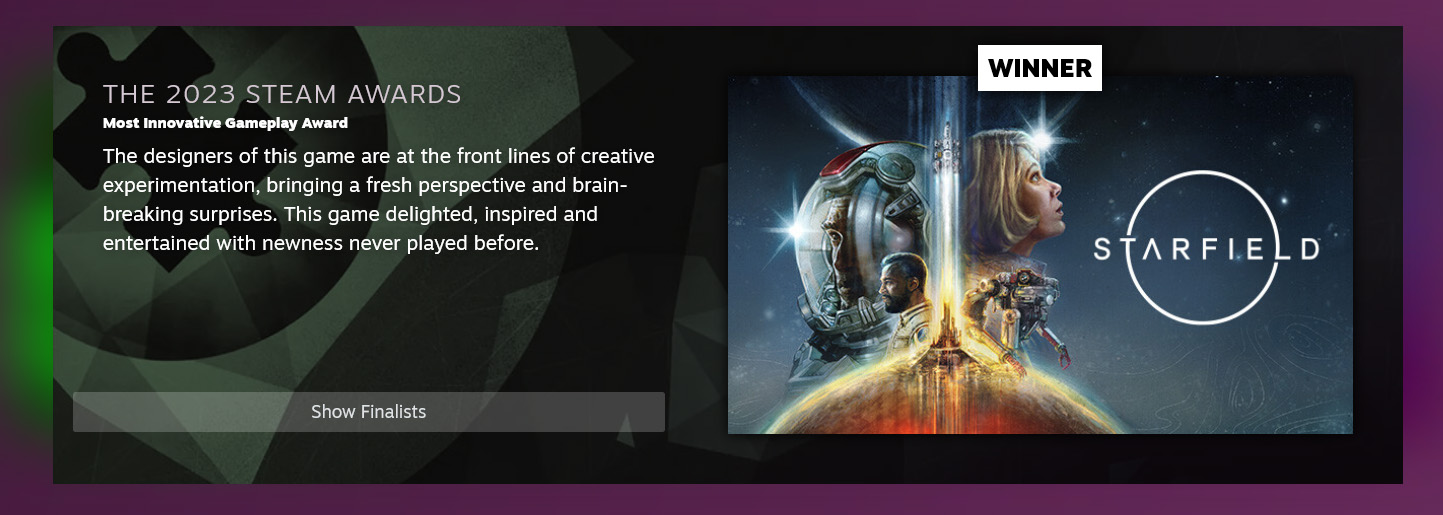UnknownSouljer
[H]F Junkie
- Joined
- Sep 24, 2001
- Messages
- 9,041
I highlighted the fact that this is a contention you're explicitly making. I'm explicitly stating that objective critique exists.All opinions are subjective, but you are trying to frame the opinion that Starfield is horrrible as objective.
No, they think both. McDonald's is primarily about cost and food addiction.What? I even responded to it. People who eat MCD food don't think it's bad, they think it tastes great. Some know they shouldn't because it's bad for your health, but that doesn't mean they think it is bad in general.
I work with youth kids, and also when they've moved up into college age. The reason any of them go is because of money. It's never out of enjoyment of the food. It's specifically dealing with bad food to take care of an immediate need. It's purely utilitarian, not out of enjoyment.
This was brought up specifically in the Starfield thread; a big criticism that fanboys make is: "oh, you only played it for 20 hours, you can't make an accurate critique."But the thing is that many steam reviewers are apparently happily eating Starfield and then claim it is a turd. I'm sorry, but if someone spends 100 hours in a game and then turns around and tells me it is a turd, I don't believe they are being genuine.
To reference your world famous MCD analogy. It's as if someone eats McDonalds every day but when asked to review it says: "food is terrible, don't eat there"
Now when people play a game for 150 hours to go through every aspect and then call it bad, the turn around response is: "well there is no way for you to say you didn't enjoy a game that you invested all that time into"?
Play time is NOT a reflection of enjoyment, only thoroughness. If anything it shows that those players gave the game more of a chance, played past the point in which others could argue "you haven't reached the good part" and then still said: "no it's still bad".
You can't have it both ways. This is especially in light of the fact that the game is heavily padded. If you want to "explore" every aspect of the games systems (that is to say ship building, exploration, combat, base building, marriage, companions, main story + universe changes, etc), the game by its nature requires a lot of time to do all of that. And the only way to accurately critique all of those things is to play this heavily padded game. I think Dan_D 's criticism highlights all of this rather well. And he is arguably more of a fan of this game than not.
Oh and about McDonald's, watch "Supersize Me". Another demonstration of thoroughness; eating McDonald's everyday for 30 days 3 meals a day to get to the point that was already known at the beginning: that McDonald's is bad (yes, including the taste of the food, Which Morgan Spurlock had trouble keeping down during the film). Or would you try and make the argument that he must have liked it to spend all that time thoroughly researching a topic? Because if the answer here is: "yes", then we really are done. There is no place to meet eye to eye.
That's been done repeatedly in this thread, and no reason will satisfy you. If you want a full 8 hour breakdown that will piece by piece discuss why the game is bad, here you go:It started with me not understanding why they hate it so much and why is it considered much worse than Skyrim, "It's bad M'kay" is not a meaningful answer to that question.
Which is what? All opinions are subjective, I want to know the objective reasons through which people arrive at the opinion that it is trash.
View: https://youtu.be/-UOhCjB0AEI?si=3I6vQ2ulf9F1yrnh
However, I doubt you'll watch it, not because of it's length, but because your interest in figuring out why people think it's a bad game isn't that deep. You're upset that people don't like what you like, while not wanting to register the "opinions" levied against it. You're spending more time defending the game than you are listening.
The game has no design document, is a mishmash of systems, doesn't allow for any for any actual RPG mechanics (everything is false choice, yes, sarcastic yes, bad choice that the game will deny you, or do this quest later), doesn't have a worthwhile story, doesn't have meaningful quest design, doesn't have good mechanics. It's an empty world with nothing to do in it. There is no characterization. There is nothing that you can do inside the game world that matters (I'm referring to meaningful choice, not the hero's journey as it's presented in this game). All morality is a binary choice. Even the exploration serves no purpose passed: collect the stuff and look at the pretty vista.
It feeds you down the pipe that Todd Howard and team want to force you down, which fine, fair enough. But then it has nothing of any remote interest to say.
The fact that the engine sucks and more or less forces the player through often 3 loading screens at a time is just the frosting on this bad game. But in terms of engine and mechanics those are both fair criticisms to be levied against it. As much as you try and compare that to ME1 or Outer Worlds, the frequency of loading screens is nowhere near as oppressive as Starfield. Especially when paired with the very frequent, unskippable cut-scenes for every one of those actions.
And this is also again to say nothing about optimization or level of bugs (which for a Bethesda game is pretty good. Thanks to Microsoft forcing a year of bug fixing). Everything I've talked about up to this point is just the content of the game itself.
Or also: "Stop hating what I like".
Last edited:
![[H]ard|Forum](/styles/hardforum/xenforo/logo_dark.png)
